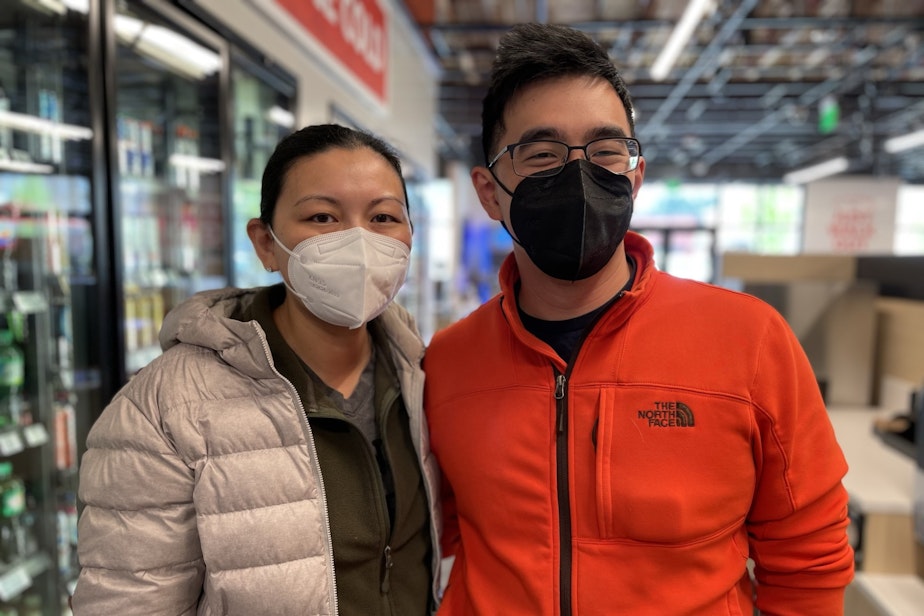What's your college advice for Washington students?: Today So Far

Washington state needs ferry workers. But what is the advice we are giving to young students as they plan their post-education careers?
This post originally appeared in KUOW's Today So Far newsletter for May 16, 2022.
Washington state needs ferry workers. The state's ferry system has been saying this for a long time. We've known that many ferry workers are retiring or aiming to retire soon. That means crew shortages and less-reliable ferry routes. Anybody who commutes from Kitsap to Seattle knows this well.
As KUOW's Soundside reports, Washington State Ferries are starving for workers as we head into the summer months, filled with increased ridership. The hiring process is pretty straightforward, too. WSF has a year program to train you up and get you onboard. Hearing this story got me thinking about the advice I received as a young student growing up around Washington. And maybe it's the advice you've been giving to others as well. I'm curious to hear your thoughts.
Teachers would often bring someone into our K-12 classes to hype the benefits of attending college. The main selling point was delivered via charts showing higher earnings of college graduates. To a student, the message was clear: Go to college, get any degree, get rich. I even had a teacher sit me down and firmly say, "Just go into debt. Everybody has student loans. Go to college." I ended up taking the scenic route through college. But on that route I noticed others cycling back into classes with the aim of improving a paycheck. Or I saw friends already with degrees spending more money on trade schools with hopes of getting a career. Turns out, there was a message we never got all those years ago — there are other options. Those options are in demand today.
Consider that a welder can earn about $50,000 annually right out of a trade school, and has the potential to go higher. That's roughly the same for a deckhand on a ferry (Seattle is among the higher-paying cities for the maritime industry). Electricians do OK, too. Train up for a medical job and the money goes even further. A new radiology technologist in our area can go straight into earning more than $60,000 with the potential for more. Nursing jobs vary, but also pay well. Don't even get me started on coding boot camps. Trade schools, apprenticeships, and other paths don't seem to get enough credit. And recently, they have been placed on the chopping block at Seattle colleges.
RELATED: Trade programs at Seattle Central avoid the axe, for now
Sponsored
"You can go to school for a year ... and be eligible to start working with a really great-paying job," said Dana Warr with Washington State Ferries. "A lot of students are spending four years and not getting the pay walking out like somebody at Seattle Maritime Academy .... here at ferries, you are here within your community, you live within your community, you go home at the end of your shift, you are with your family. That's benefit. I think people looking for maritime jobs should really think about how ferries can allow for more work/life balance than other maritime organizations."
Can someone afford living in Seattle with those salaries? Probably not very well. But they are on par with English, Philosophy, and other degrees cranked out at four-year universities. I don't have any youngsters to impart my anecdotal advice to these days. But this all makes me wonder what I would say. What did you hear growing up? What do you tell your kids? And what have you experienced? Let me know at dyer@kuow.org.
And hear Soundside's full conversations with Dana Warr with Washington State Ferries, as well as with Danny Blanchard with the Seattle Maritime Academy here.
Here are a couple other stories that KUOW is reporting today:
Sponsored
AS SEEN ON KUOW

Wes and Leann Wu shop at an Amazon Go story in Mill Creek. They say they are OK with Amazon storing biometric data for shopping convenience. Biometric data can include scanning your face. Washington law states that companies must obtain customer permission to record such data. A recent lawsuit brought by an Amazon shareholder argues that the company is running afoul of this law. (Joshua McNichols / KUOW)
DID YOU KNOW?
We've all heard that slogan, "Seattle is dying." But is it really? Apparently, our local economy never got that memo. Seattle ranks fifth in the nation for starting your career, according to a new WalletHub assessment. WalletHub ranked 182 cities, considering starting salaries, job growth, cost of living, commuter-friendly jobs, and more. Basically, the intersection of career and quality of life.
Sponsored
And Seattle isn't the only Washington town that made it on the list. Tacoma comes in at 34th. Spokane is 44th. Tacoma actually ranks first when it comes to starting salaries. And Seattle ranks first when it comes to cities with a high population of ages 25-34.
Salt Lake City, Utah tops the list. However, what is not considered in the rankings is the fact you would have to live in Salt Lake City, so I'm not sure that one counts.
ALSO ON OUR MINDS

Sponsored
The 10 people killed, and an additional three injured, make this weekend's racially motivated attack in a Buffalo, New York, supermarket the deadliest mass shooting of the year in the United States. It is also the 198th mass shooting in 2022. With 19 weeks into the year, this averages out to about 10 such attacks a week.

